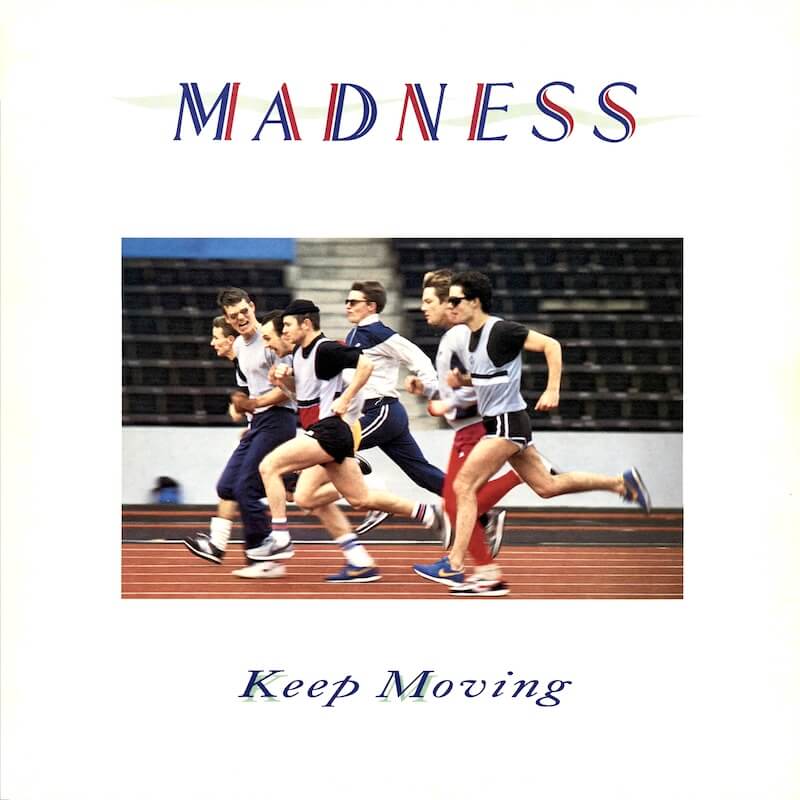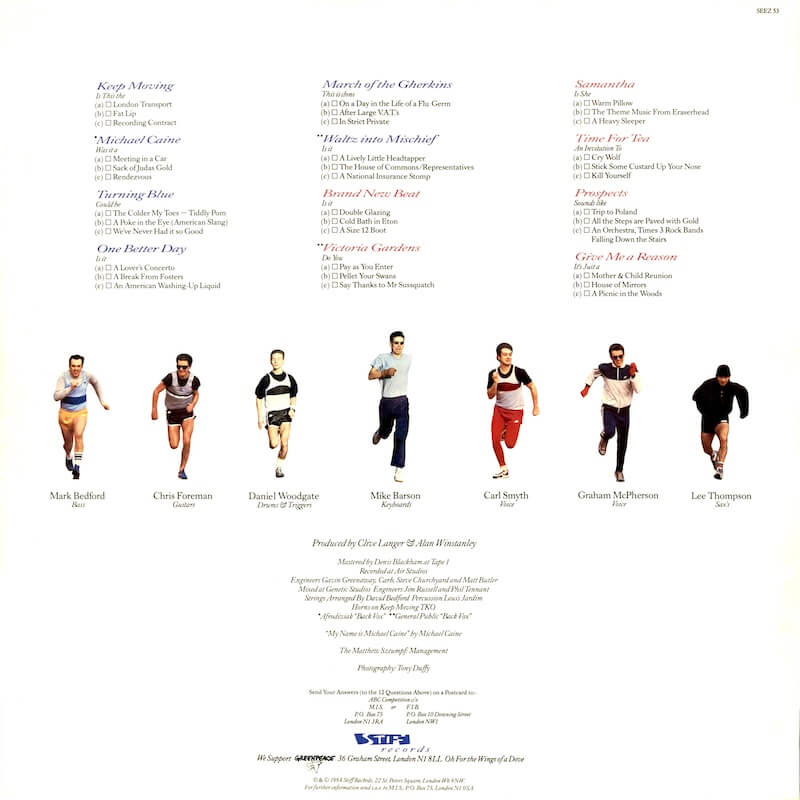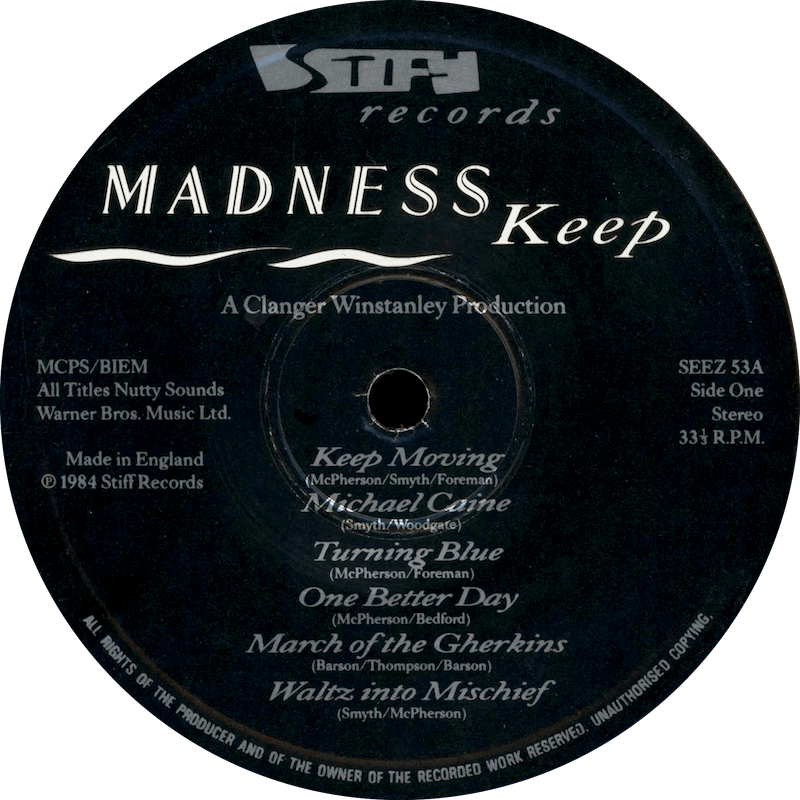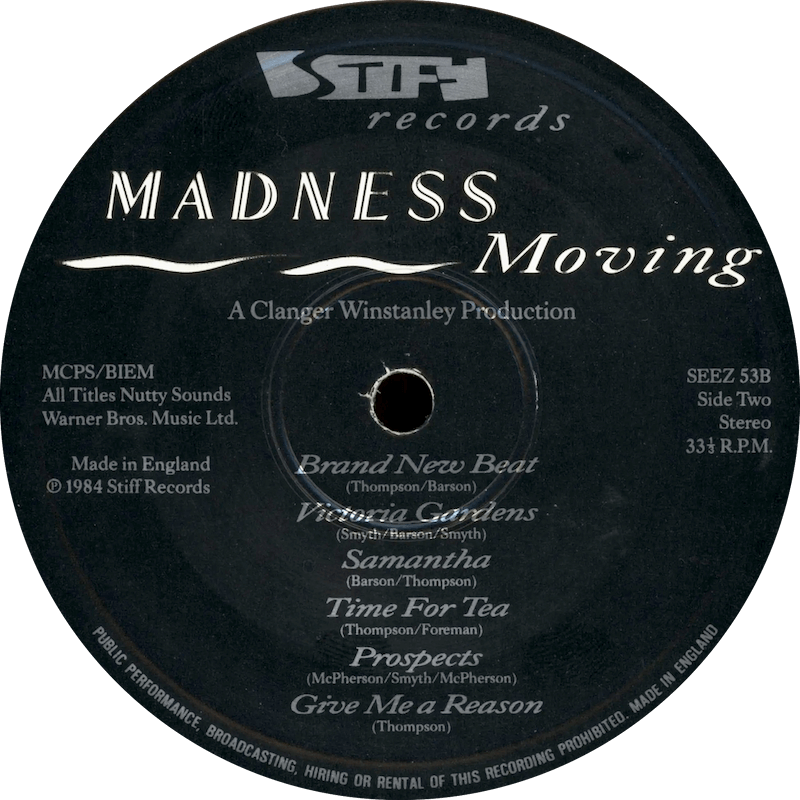
Keep Moving
OVERVIEW
Keep Moving, released in February 1984, stands as a turning point in the discography of Madness. As their fifth studio album and the last to be released under the Stiff Records label, it captures a band in transition—both sonically and personally. The departure of founding keyboardist Mike Barson shortly after its release adds a poignant undertone to what would otherwise be remembered solely for its vibrant experimentation and maturing sound. Barson’s exit was not abrupt; he had informed the band months earlier that he intended to leave to focus on his personal life and family in Amsterdam. Though he stayed to complete the album and performed a final show at the Lyceum Ballroom in December 1983, his departure in June 1984 marked the end of an era for Madness.
The album is a showcase of the band’s evolution from their ska and 2 Tone roots into a more polished, pop-oriented sound. This shift was brought to life under the guidance of producers Clive Langer and Alan Winstanley, longtime collaborators who helped steer the group into more refined and emotionally resonant territory. Though the quirky humor and energetic flair that had defined Madness were still present, Keep Moving revealed a depth and diversity not always emphasized in their earlier records.
The 12-track UK version includes standout singles like “Michael Caine” and “One Better Day,” both of which achieved Top 20 status in the UK, peaking at No. 15 and No. 17 respectively. “Michael Caine,” in particular, is notable for its unique concept and cameo vocal contribution from the actor himself, creating a playful yet layered piece of pop. Meanwhile, “One Better Day” revealed a more contemplative, jazz-tinged side of the band, with its reflective lyrics and moody instrumentation. These tracks, while different in tone and style, both reflect the band’s growing confidence in stepping beyond the bounds of their established identity.
In terms of commercial performance, Keep Moving was a solid success. It peaked at No. 6 on the UK Albums Chart and reached No. 109 on the US Billboard 200—Madness’s best US showing for a studio album at the time. While the band had never quite cracked the American mainstream the way they had in Britain, this album represented their closest brush with transatlantic chart success.
Critical reception of Keep Moving was generally positive. Rolling Stone awarded it four out of five stars, highlighting the band’s successful shift in style and the sophistication of the production. The NME ranked it No. 13 in their “Albums of the Year” list for 1984, acknowledging the artistic growth and musical quality compared to earlier efforts such as Absolutely. While some retrospective reviews have critiqued aspects of the production as being overly elaborate, the consensus remains that Keep Moving is a thoughtful and mature record that rewards repeated listening.
An interesting wrinkle in the album’s history is the variation between the UK and US versions. The American release included additional tracks like “Wings of a Dove” and “The Sun and the Rain,” both of which had been UK singles but were not part of the original British album. This change was designed to appeal to US audiences and has sparked debate among fans over which version is definitive. Some listeners, particularly in retrospective reviews, have expressed a preference for the US track listing for including what they consider to be two of the band’s strongest songs.
Beyond the music itself, Keep Moving left a cultural mark with its Olympic-themed cover art. Featuring the band as runners frozen mid-sprint, the imagery symbolized both literal and metaphorical momentum. The album’s title and artwork hinted at the group’s ethos during a time of change: to keep going, to evolve, and to embrace the unknown.
In the years since its release, Keep Moving has retained a respected place in Madness’s catalogue. It was reissued in 2010 by Salvo/Union Square, complete with bonus tracks and liner notes by comedian and fan Phill Jupitus, reaffirming its legacy for both longtime fans and new listeners. The album remains a testament to Madness’s ability to adapt and grow without losing the charm and originality that made them a beloved part of British pop music history.
SINGLES
RELEASE DETAILS
TRACK LISTING
| Disc | Position | Track | Version | Duration |
|---|---|---|---|---|
| 1 | 1 | Keep Moving | 3:33 | |
| 1 | 2 | Michael Caine | 3:39 | |
| 1 | 3 | Turning Blue | 3:06 | |
| 1 | 4 | One Better Day | 4:06 | |
| 1 | 5 | March Of The Gherkins | 3:30 | |
| 1 | 6 | Waltz Into Mischief | 3:36 | |
| 1 | 7 | Brand New Beat | 3:17 | |
| 1 | 8 | Victoria Gardens | 4:32 | |
| 1 | 9 | Samantha | 3:14 | |
| 1 | 10 | Time For Tea | 3:08 | |
| 1 | 11 | Prospects | 4:15 | |
| 1 | 12 | Give Me A Reason | 3:26 |
CHART HISTORY
| Position Date | Position |
|---|---|
| 03/03/1984 | 6 |
| 10/03/1984 | 7 |
| 17/03/1984 | 13 |
| 24/03/1984 | 18 |
| 31/03/1984 | 27 |
| 07/04/1984 | 27 |
| 14/04/1984 | 37 |
| 21/04/1984 | 38 |
| 28/04/1984 | 34 |
| 05/05/1984 | 55 |
MUSICANS
| Musican | Instrument | Role | Credit |
|---|---|---|---|
| Mike (Monsieur Barso) Barson | Piano, Organ, Vibraphone, Marimba, Harmonica | Band | |
| Chris (Chrissy Boy) Foreman | Guitar, Sitar, Slide Guitar | Band | |
| Lee (Kix) Thompson | Tenor Saxophone | Band | |
| Mark (Bedders) Bedford | Bass | Band | |
| Daniel (Woody) Woodgate | Drums, Triggers | Band | |
| Graham (Suggs) McPherson | Vocals | Band | |
| Cathal (Chas Smash) Smyth | Backing Vocals, Vocals, Trumpet | Band | |
| Michael Caine | Spoken Word | Special Guest | "My Name is Michael Caine" |
| The TKO Horns | Horns | Session Musician | |
| Luis Jardim | Percussion | Session Musician | Tracks: 1-1 to 1-12 |
| Afrodiziak | Backing Vocals | Session Musician | on 'Michael Caine' |
| General Public | Backing Vocals | Special Guest Vocalist | 'Waltz Into Michief', 'Victoria Gardens' |
PRODUCTION CREDITS
| Role | Credited | Notes |
|---|---|---|
| Producer | Clive Langer | |
| Producer | Alan Winstanley | |
| Recording Studio | Air Studios | |
| Mixed | Rushent's Mansion | Genetic Studios |
| Orchestrator | David Bedford | Strings Arrangement: Tracks: 1-12 |
| Engineer | Steve Churchyard | Recording: Tracks: 1-1 to 1-12 |
| Engineer | Gavin Greenaway | Recording: Tracks: 1-1 to 1-12 |
| Engineer | Andy Canelle | Recording: Tracks: 1-1 to 1-12 |
| Engineer | Matt Butler | Recording: Tracks: 1-1 to 1-12 |
| Engineer | Jim Russell | Mixing: Tracks: 1-1 to 1-12 |
| Engineer, Mixed | Phil Tennant | Mixing: Tracks: 1-1 to 1-12 |
| Mastering | Denis Blackham | Mastered at Tape 1 |
| Graphic Design, Art Direction | Martin Callomon | |
| Graphic Design, Art Direction | Stiff Art Department | Original Graphic Design |
| Photographer | Tony Duffy |
COPYRIGHT AND Licencing
| Ownership | Company | Notes |
|---|---|---|
| Copyright © | Stiff Records | |
| Phonographic Copyright ℗ | Stiff Records |
Representation
| Representation | Company | Notes |
|---|---|---|
| Record Label | Stiff Records | |
| Publisher | Nutty Sounds Ltd. | |
| Publisher | Warner Chappell Music Ltd. |
SHARE YOUR OWN RELEASE REVIEW WITH OUR COMMUNITY
References
Extensive efforts have been made to gather factual information and knowledge on madness from various sources and document them. These sources include publicly accessible websites, books and publications, historical artefacts, and other pertinent materials. As a result, a comprehensive index of resources has been compiled and integrated into the website. These resources, if relevant to this article, are listed below.
| Reference | Source |
|---|---|
| wikipedia.org | Website |
| discogs.com | Website |
| officialcharts.com | Website |





Reviews